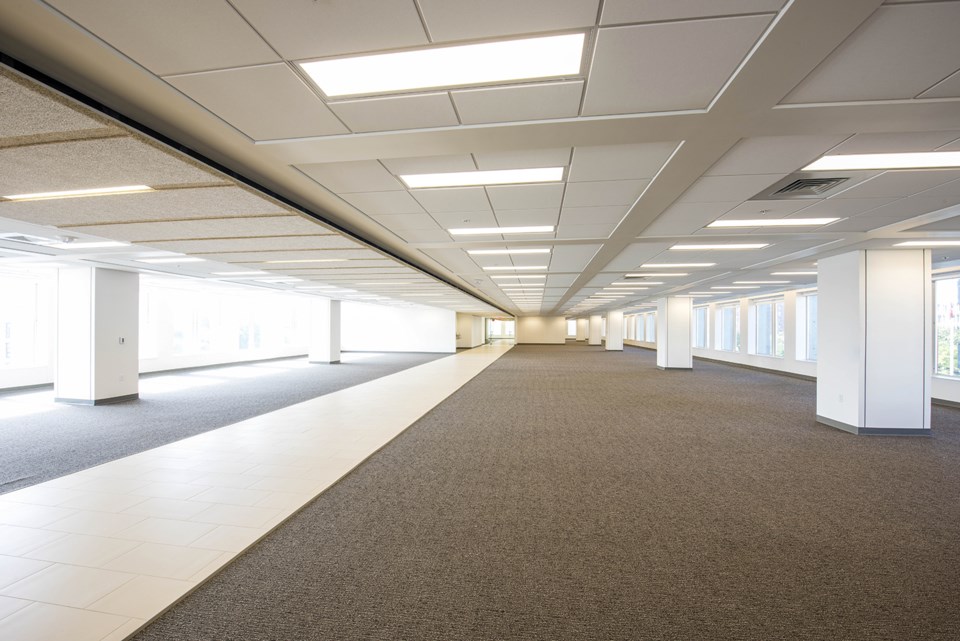Nine million square feet of Arlington office space currently is sitting idle, and things may get worse before they get better, the county government’s economic-development director told County Board members during a recent budget workshop.
“We’re trying to find companies that are in a growth stage, and get them here,” Ryan Touhill said in his first budget presentation since being appointed to lead Arlington Economic Development late last year.
Arlington’s commercial-vacancy rate of 22.1 percent (based on data compiled by CoStar) is now higher than the pre-COVID peak of 20.2 percent in 2015, and “our pipeline [of new firms] is smaller than in years past,” Touhill said.
If there is any good news, it’s that trophy-class office space seems to be outperforming the overall market, even as owners of less modern and amenity-laden properties are “struggling, having a harder time leasing,” said Touhill, who came to the Arlington position from Alexandria after the post briefly was held by Telly Tucker.
Also positive, kind of: The seemingly unending stream of wars – real or proxy – that the nation has found itself enmeshed in remains big business for those in the defense and tech sectors, which have held up despite the overall market downturn. That, however, is being offset by downsizing by the federal government itself and the non-profit sector.
As for blockbuster projects? “We have seen continued competitiveness for the few large deals that are in the pipeline,” Touhill said. The department is about to hire a public-relations firm – for the first time in 15 years – to augment its in-house promotional efforts.
If vacancy rates remain elevated in a post-COVID world, many existing commercial properties across the county could either be razed or redeveloped, making way for residential properties. And that would be bad news for the Arlington County government, which relies on a large commercial sector to fuel its world-class spending habits, as commercial properties bring in more revenue and require far less in the way of government services than do residential properties.
Example: A residential property valued at $1 million brings in about $10,300 in real-estate-tax revenue, a good deal for the county government unless the occupants include any public-school students, which cost the county and its taxpayers about $20,000 per year, each, before any other government services, from public safety to roads to libraries, are factored in.
Residential homeowners have been bearing the brunt of the increasing tax burden since the onset of the pandemic. Unlike neighboring jurisdictions, the Arlington County Board has declined to lower tax rates to offset three years’ worth of much higher home assessments.
Looming over economic-development issues is the question of Amazon’s long-term commitment to the community, following its announcement of indefinitely suspending plans for the second phase of its HQ2 development plan in Arlington.
At a March 21 County Board meeting, board chairman Christian Dorsey attempted some words of reassurance.
“They have affirmed that their commitment . . . is still on track,” he said.
But that refers to the original commitment, which anticipated full buildout of the HQ2 project by 2035. Amazon subsequently announced plans to accelerate that timetable, but now has backed away from that.
(The first part of the HQ2 project, the MetPark development, is on track for an opening by mid-year.)
County Manager Mark Schwartz’s proposed fiscal 2024 budget included a 3-percent cut in General Fund revenue in support of Arlington Economic Development (which also oversees the county government’s arts and cultural initiatives). But some County Board members said that was the wrong approach to take.
“I would rather focus on being stable or even investing more,” board member Takis Karantonis said.
But, County Board Chairman Christian Dorsey added, there was an expectation the additional resources would reap dividends.
“What are the activities that actually lead to success?” Dorsey asked rhetorically.
Schwartz’s General Fund budget proposal for Arlington Economic Development for fiscal 2024 is $9.785 million.



